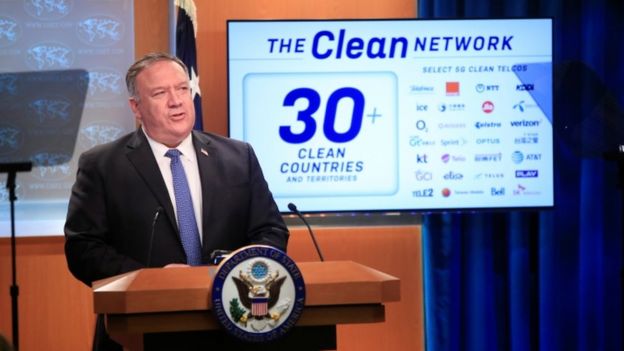Is the US about to split the internet?
Госсекретарь США Майк Помпео говорит, что хочет «чистый» интернет.
Под этим он подразумевает, что хочет устранить китайское влияние и китайские компании из Интернета в США.
Но критики считают, что это поддержит тревожное движение к разрушению глобального интернета.
Так называемый «сплинтернет» обычно используется, когда речь идет о Китае, а в последнее время о России.
Идея состоит в том, что в глобальности Интернета нет ничего неотъемлемого или предопределенного.
Для правительств, которые хотят контролировать то, что люди видят в Интернете, имеет смысл взять на себя ответственность за это.
Великий китайский файрвол - лучший пример того, как нация возводит вокруг себя интернет-эквивалент стены. Вы не найдете поисковую систему Google или Facebook в Китае.
Люди не ожидали, что США последуют примеру Китая.
Тем не менее критики считают, что это следствие заявления Помпео в четверг.

Подпись к изображению Майк Помпео: «Приложения Китайской Народной Республики угрожают нашей конфиденциальности, распространяют вирусы и распространяют пропаганду и дезинформацию»
Г-н Помпео сказал, что хочет удалить «ненадежные» приложения из магазинов мобильных приложений США.
«Приложения Китайской Народной Республики угрожают нашей конфиденциальности, распространяют вирусы и распространяют пропаганду и дезинформацию», - сказал он.
The first question that sprang to mind was: what are the Chinese apps that Mr Pompeo does trust? The assumption is very much that he's talking about ALL Chinese apps.
"It's shocking," says Alan Woodward, a security expert based at the University of Surrey. "This is the Balkanisation of the internet happening in front of our eyes.
"The US government has for a long time criticised other countries for controlling access to the internet… and now we see the Americans doing the same thing."
That might be a slight exaggeration. Mr Pompeo's reasons for "cleaning" the US network of Chinese companies is very different to authoritarian government's desire to control what is said online.
But it's true that if Mr Pompeo were to go down this road, it would be reversing decades of US cyber-policy.
If there is one country that has championed a free internet, based on the constitutional tenets of free speech, it is America.
President Donald Trump's administration has taken a different approach though, in part because of the legitimate security concerns that some Chinese companies operating in the US raise.
WeChat warning
Alex Stamos, former chief security officer at Facebook, told me that much-mentioned TikTok was just the tip of the iceberg in terms of Chinese apps to worry about.
"TikTok isn't even in my top 10," he told me.
The app Mr Stamos suggests the US should be more wary of is Tencent's WeChat.
"WeChat is one of the most popular messaging apps in the world… people run companies on We Chat, they have incredibly sensitive information."
Mr Pompeo has also namechecked WeChat as a potential future target.
It's hard not to view this through the prism of the US elections in November. Mr Trump's anti-China rhetoric isn't limited to tech.
Policy or posture?
So is this a policy position - or simply posture?
Mr Trump may also of course lose in November. The Democrats would probably take a more moderate position on Chinese tech.
But, as it stands, Mr Trump's vision of the US internet - an internet in the main free of China - makes it a far more divided place.
The great irony is that the internet would then look a lot more like China's vision.
Just look at TikTok itself. If Microsoft does buy the US arm there will be three TikToks.
A TikTok in China (called Douyin). A rest of the world TikTok. And a TikTok in the US.
Could that be a model for the future of the internet?










